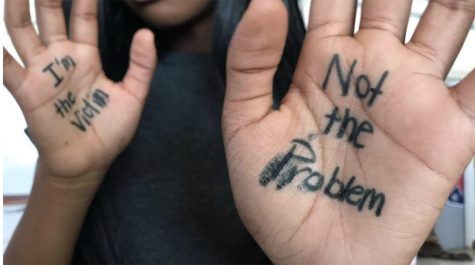Assault Victims Demand Respect
March 16, 2018
According to RAINN, 1 in four women and one in six men will be a victim of sexual assault during their lifetime. As shocking as these statistics, what’s even more shocking is that out of ten sexual assault cases, eight of the victims will know their perpetrator. Sadly, these numbers only represent those who have come forward about their experiences.
When it comes to sexual assault, the world has become desensitized to these horrendous acts that men and women are subjected to on a daily basis. Of course, with celebrities like Harvey Weinstein and Kevin Spacey facing well deserved scrutiny for their disgusting actions, that is all the public seems to care for. Yes, we’ve heard the perpetrators’ testimonies and accounts of how they are not guilty, but what about their victims?
Media should focus on the perpetrators and avoid giving them a platform to excuse their behavior, nor allow them any type of sympathy. Forget speculating what was going on in their mind, their life accomplishments, how their families are going to deal with the accusations, or how their future will suffer now that the world knows what disgusting trash they are.
It is the victims of sexual assault who we need to focus on, for they are the ones who are suffering the most.
When people are sexually assaulted, they are stripped of their ability to feel safe and left to deal with a range of problems ahead of them that may take weeks, months, or even years to grasp what happened to them. Some effects that victims face after dealing with their assaults include Post Traumatic Stress Disorder (PTSD), depression, and suicidal thoughts.
Talking to victims of sexual violence may be difficult, but it is necessary to be informed on what many men and women are forced to endure on a daily basis.
If they decide to open up to you about their assault, it’s essential that you attempt to understand them, see what they’re going through, and be there for them in their time of need.
When they’re sharing their experience, make sure that they are comfortable opening up to you and also doing it on their own terms. Pressuring someone to share their experience is never okay. Instead, the effects of coercing someone to open up may backfire and may force them to relive the experience.
Take their story seriously and be attentive. If they are trying to talk to you about their experience and you’re on your phone, avoiding eye contact, or just being plain inattentive, then, you are honestly disgusting. Telling someone what happened is definitely not easy for an assault victim, so feeling like they’re not being listened to is going to silence them and keep them from opening up to anyone again.
Most victims will start questioning themselves. They feel like they’ve lost a part of themselves and when they come out to others about their assault, they start to wonder how the world views them. Some people feel ashamed of what happened to them and believe that if they were to share what happened to them, others will view them as damaged or feel disgusted with them. That fear of how others will see them is what keeps them silent about their experience. So, it’s important for them to know that you won’t judge them and hopefully, will still be there for them, accept them for who they are, and understand them more.

No one person who has gone through sexual assault is the same. Victims don’t want you to pity them. They want you to see them as how they were in your eyes before they told you their story. If they choose to share their story with you, it’s because they want you to understand why they are the way they are.

